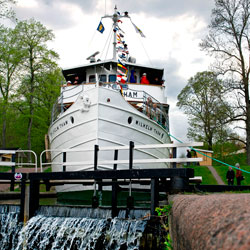Go by canal boats through beautiful Sweden.
Göta Kanal, a historic site.
Travel the waterway on the Göta canal, rent a boat, hike or cycle along the canal and spend the night at a nice guest house or hostel. The alternatives are many at Göta Canal.
We can thank the naval officer, count and city councilor Baltzar von Platen for his idea with his great canal project. In 1806 Baltzar presented his project together with the Scotsman Thomas Telford and in 1810 Charles XIII granted that the canal could be built. In the same year, construction began at Motala.
It is hard to understand that in those days people only dug with wooden shovels! Think how much time it took and how many people were required for this work.
Today, the canal is one of Sweden's largest and most important cultural and historical buildings and many holidays and excursions are spent here by both Swedes and tourists from different parts of the world.
Unfortunately, Baltzar was not allowed to attend the inauguration of his masterpiece 22 years after construction began. He died 3 years earlier. The construction took 22 years and was carried out by over 58,000 men.

190 km long with 58 locks
The Göta canal stretches from Sjötorp on Vänern to Mem on the Baltic Sea (190 km) and connects with Trollhätte canal and Göta River out towards the Kattegatt. On April 12, 1810, Baltzar von Platen received permission from the king to start building the Göta Canal. Considerations and planning for the waterway to be able to get between the Kattegat and the Baltic Sea via Vänern and Vättern had been going on for several years and now it would become a reality. Together with the British canal builder Thomas Telford, the realization of the canal now began. It would take over 20 years to build the canal.
One of the reasons for this waterway through Sweden was to escape the Oresund Strait to the Danes for ships that would pass the Oresund on their way around the southern tip of Sweden. Much of the canal was dug by hand and the workers consisted of over 58,000 soldiers from various regiments in Sweden as well as private hired workers and Russian deserters who voluntarily joined the construction. The soldiers who took part in the work then received a silver medal with the image of King Karl XIV Johan and the inscription "For effective assistance to Hafven's association. Given by Göta-kanal-Bolaget".
Göta Kanal was inaugurated on 26 September 1832 by the king and is said to have cost 9 million riksdaler (approx. 14 billion in today's monetary value). Unfortunately, Baltzar von Platen never got to see his life's work completed as he died in 1829.
Just shipping by ship was very important during the 19th century. When the railway was expanded more and more, canal freight also decreased drastically. The Öresund toll was abolished so traffic on the Göta canal gradually decreased. In the 1870s, tourists had opened their eyes to boating along the canal. It wasn't until around the 1970s that the tourist flow increased drastically.
Today, the canal is one of Sweden's most culturally historic objects, and every summer boat holidays along the canal are planned. Tourists from Sweden and foreign tourists have opened their eyes to travel at a leisurely pace through a fantastic landscape on board beautiful boats with good food. The highlights of the trip, apart from the beautiful nature and picturesque communities, are all the locks you pass to get between Gothenburg and Stockholm.
Along the canal there are 58 locks and 2 aqueducts. During a stop at a lock there is time to get off the boat and stroll along the side of the canal and look around the surroundings.
Several different tourist activities around and on Göta Kanal
Today there are several different companies that offer different services and holiday activities on and near Göta Kanal. You can, for example, rent a boat, go on various canal boats, cycle, hike, spend the night and a few other goodies.